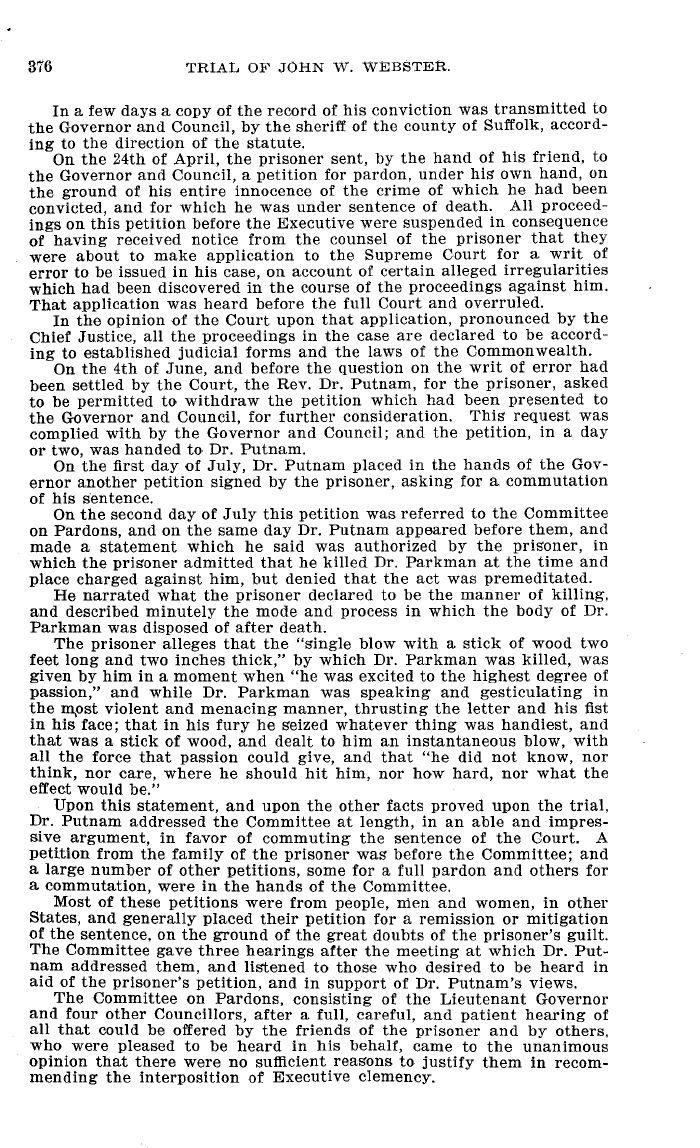|
376 TRIAL OF JOHN W. WEBSTER.
In a few days a copy of the record of his conviction was transmitted to
the Governor and Council, by the sheriff of the county of Suffolk, accord-
ing to the direction of the statute.
On the 24th of April, the prisoner sent, by the hand of his friend, to
the Governor and Council, a petition for pardon, under his own hand, on
the ground of his entire innocence of the crime of which he had been
convicted, and for which he was under sentence of death. All proceed-
ings on this petition before the Executive were suspended in consequence
of having received notice from the counsel of the prisoner that they
were about to make application to the Supreme Court for a writ of
error to be issued in his case, on account of certain alleged irregularities
which had been discovered in the course of the proceedings against him.
That application was heard before the full Court and overruled.
In the opinion of the Court upon that application, pronounced by the
Chief Justice, all the proceedings in the case are declared to be accord-
ing to established judicial forms and the laws of the Commonwealth.
On the 4th of June, and before the question on the writ of error had
been settled by the Court, the Rev. Dr. Putnam, for the prisoner, asked
to be permitted to withdraw the petition which had been presented to
the Governor and Council, for further consideration. This request was
complied with by the Governor and Council; and the petition, in a day
or two, was handed to Dr. Putnam.
On the first day of July, Dr. Putnam placed in the hands of the Gov-
ernor another petition signed by the prisoner, asking for a commutation
of his sentence.
On the second day of July this petition was referred to the Committee
on Pardons, and on the same day Dr. Putnam appeared before them, and
made a statement which he said was authorized by the prisoner, in
which the prisoner admitted that he killed Dr. Parkman at the time and
place charged against him, but denied that the act was premeditated.
He narrated what the prisoner declared to be the manner of killing,
and described minutely the mode and process in which the body of Dr.
Parkman was disposed of after death.
The prisoner alleges that the "single blow with a stick of wood two
feet long and two inches thick," by which Dr. Parkman was killed, was
given by him in a moment when "he was excited to the highest degree of
passion," and while Dr. Parkman was speaking and gesticulating in
the most violent and menacing manner, thrusting the letter and his fist
in his face; that in his fury he seized whatever thing was handiest, and
that was a stick of wood, and dealt to him an instantaneous blow, with
all the force that passion could give, and that "he did not know, nor
think, nor care, where he should hit him, nor how hard, nor what the
effect would be."
Upon this statement, and upon the other facts proved upon the trial,
Dr. Putnam addressed the Committee at length, in an able and impres-
sive argument, in favor of commuting the sentence of the Court. A
petition from the family of the prisoner was before the Committee; and
a large number of other petitions, some for a full pardon and others for
a commutation, were in the hands of the Committee.
Most of these petitions were from people, Men and women, in other
States, and generally placed their petition for a remission or mitigation
of the sentence, on the ground of the great doubts of the prisoner's guilt.
The Committee gave three hearings after the meeting at which Dr. Put-
nam addressed them, and listened to those who desired to be heard in
aid of the prisoner's petition, and in support of Dr. Putnam's views.
The Committee on Pardons, consisting of the Lieutenant Governor
and four other Councillors, after a full, careful, and patient hearing of
all that could be offered by the friends of the prisoner and by others,
who were pleased to be heard in his behalf, came to the unanimous
opinion that there were no sufficient reasons to justify them in recom-
mending the interposition of Executive clemency.
|

